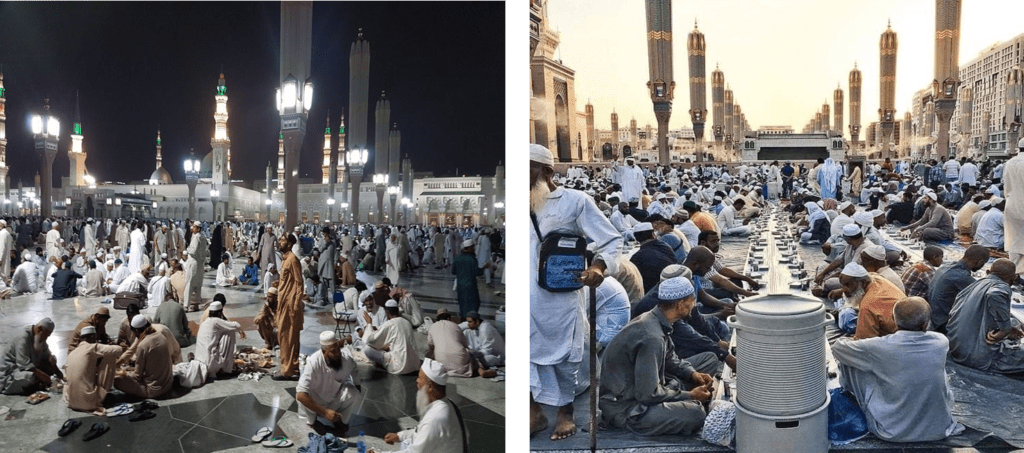Holy month of Islam, Ramadan, declared by the World and Muslims.
The time in which Muslims do fasting, praying, and time of spiritual reflection and during which Muslims from dawn until sunset avoid food, drink, and other physical needs.
The main reason for fasting during Ramadan is to increase spiritual discipline and loyalty to Allah.
It is a time for Muslims to reflect on their actions, ask forgiveness for their sins from Allah, and refine their bound with Allah.
Fasting during Ramadan is also a way to develop generosity for those who are less favoured, experience hunger, and thirst.
As in other Muslim-majority countries, Saudi Arabia celebrates Ramadan similarly.
Every night during the month of Ramadan, Muslims perform a special prayer called Taraweeh.
In Saudi Arabia, Muslims also share Iftar (the evening meal that breaks the fast) with friends and family.
Moon Sighting: Start & End Date of Ramadan 2023

The Ramadan starts with the sighting of the crescent moon.
The beginning of the holy month, however, must be determined by a committee made up of religious scholars, astronomers, and other authorities as part of a moon-sighting exercise at night. A certain number of sightings related to the new crescent moon’s appearance and cycle which heralds the beginning of Ramadan are observed by the committee.
As per the recent report, The holy month of Ramadan to be expected to fall in Saudi Arabia on Wednesday 22 of March, 2023, and will be followed by Eid al Fitr on Friday 21 of April, 2023.
The dates will naturally be confirmed after the moon sighting.
Preparation of Ramadan

Mostly preparation begins before the month of Ramadan.
You must prepare mentally and physically to have the right mindset before Ramadan.
For this, setting intentions and goals for the month will help you to stay in the right direction, such as reading the Quran daily or praying more regularly.
Prior to Ramadan, it is important to gradually adjust your sleeping and eating norms.
Before the fast begins, try to wake up earlier and have Suhoor before sunrise.
For a daytime energy boost, avoid caffeine and sugary foods.
List of Imams for Taraweeh Prayer in Mecca
Ramadan is a month of immense blessings and the community iftars at mosques and other public places is one of these blessings.
Traweeh and Tahajjud Prayers lead by Imams authorized by Saudi Arabia authorities of Haramain Sharifain at the Masjid Al Haram, Makkah during Ramadan are:
- Sheikh Abdullah Awad Al Juhany
- Sheikh Abdur Rahman Al Sudais
- Sheikh Saud Al Shuraim
- Sheikh Maher Al Muaiqly
- Sheikh Sheikh Yasir Al Dawsary
- Sheikh Bandar Baleelah
Taraweeh
| Night of Ramadan: | First Rakat + Second Rakat and Witr |
|---|---|
| 1st | Sheikh Dawsary + Sheikh Sudais |
| 2nd | Sheikh Juhany + Sheikh Maher |
| 3rd | Sheikh Baleelah + Sheikh Dawsary |
| 4th | Sheikh Juhany+ Sheikh Sudais |
| 5th | Sheikh Juhany + Sheikh Maher |
| 6th | Sheikh Baleelah + Sheikh Dawsary |
| 7th | Sheikh Baleelah + Sheikh Sudais |
| 8th | Sheikh Juhany + Sheikh Maher |
| 9th | Sheikh Baleelah + Sheikh Dawsary |
| 10th | Sheikh Juhany+ Sheikh Sudais |
| 11th | Sheikh Juhany + Sheikh Maher |
| 12th | Sheikh Baleelah + Sheikh Dawsary |
| 13th | Sheikh Dawsary + Sheikh Sudais |
| 14th | Sheikh Juhany + Sheikh Maher |
| 15th | Sheikh Baleelah + Sheikh Dawsary |
| 16th | Sheikh Baleelah + Sheikh Sudais |
| 17th | Sheikh Juhany + Sheikh Maher |
| 18th | Sheikh Dawsary + Sheikh Sudais |
| 19th | Sheikh Juhany + Sheikh Sudais |
| 20th | Sheikh Juhany + Sheikh Maher |
| 21th | Sheikh Juhany + Sheikh Dawsary |
| 22th | Sheikh Juhany + Sheikh Baleelah |
| 23th | Sheikh Dawsary + Sheikh Baleelah |
| 24th | Sheikh Juhany + Sheikh Dawsary |
| 25th | Sheikh Juhany + Sheikh Baleelah |
| 26th | Sheikh Dawsary + Sheikh Baleelah |
| 27th | Sheikh Juhany + Sheikh Dawsary |
| 28th | Sheikh Juhany + Sheikh Baleelah |
| 29th | Sheikh Dawsary + Sheikh Sudais |
| 30th | Sheikh Juhany + Sheikh Dawsary |
Tahajjud
| Night of Ramadan: | First Rakat + Second Rakat and Witr |
|---|---|
| 21th | Sheikh Baleelah + Sheikh Sudais |
| 22th | Sheikh Dawsary + Sheikh Maher |
| 23th | Sheikh Juhany+ Sheikh Sudais |
| 24th | Sheikh Baleelah + Sheikh Maher |
| 25th | Sheikh Dawsary + Sheikh Sudais |
| 26th | Sheikh Juhany+ Sheikh Maher |
| 27th | Sheikh Baleelah + Sheikh Sudais |
| 28th | Sheikh Dawsary + Sheikh Maher |
| 29th | Sheikh Juhany + Sheikh Baleelah |
| 30th | Sheikh Baleelah + Sheikh Maher |
Umrah During Ramadan

Millions of Muslims travelled to Makkah before the pandemic to visit the Great Mosque of Makkah (Masjid al-Haram) and perform various religious rituals.
Furthermore, Muslim pilgrims also perform the Umrah, which is equivalent to the Hajj (the act of worship Allah) in the month of Ramadan, which entails a trip to the Holy City and performing a set of rituals.
However, Every visitor or resident of Saudi Arabia can perform Umrah once throughout the month of Ramadan. – Arab News
Suhoor and Iftar

Fasting occurs during the dawn-to-sunset period, when Muslims avoid eating, drinking, and taking care of other physical needs.
Ramadan is a time when healthy and balanced eating is important, as well as a nutritious meal for breaking the fast.
People eat sehri before Fajr Adhan that is called Suhoor, and fast begins which completes at the time of Maghrib Adhan.
From Fajr till Maghrib people avoid eating, drinking and many other things which are abided in our Islam and after Maghrib Adhan they break their fast with Dates and Water (according to the Sunnah) and other food which is named as iftar time.
Ashras in Ramadan
“Ashra” is an Arabic word which literally means “Ten”.
Whole month of Holy Ramadan includes three Ashras consists of ten days.
Ramadan Ashras include specific Duas, mentioned below.
Do’s and Don’ts of Ramadan in Saudi Arabia

The month of Ramadan is strictly observed in Saudi Arabia.
Therefore, there are some rules needs to be followed by individuals, mentioned below.
- Although non-Muslims doesn’t fast during Ramadan, but they avoid all in publicly during the day, as it’s punishable by law, public word includes all open and closed areas like park, malls or other workplaces.
- Ramadan may bring closures or amended hours at some restaurants.
- The western diners are sometimes separated from the Islamic diners by screens in tourist-oriented restaurants.
- It is especially important to take care of your clothing during this holy month.
- When driving, be patient and show tolerance, particularly in the late afternoon and early evening.
- Business hours may become shorter in the day.
- Avoid Dance and loud music during day or in whole month.
- Don’t use offensive gestures or language.
Fast during Ramadan

Muslim of all genders must fast during Ramadan since it is one of the five pillars of Islam.
Fasting occurs during the dawn-to-sunset period, when Muslims avoid eating, drinking, and taking care of other physical needs.
Ramadan is a time when healthy and balanced eating is important, as well as a nutritious meal for breaking the fast.
People should stay hydrated by drinking lots of water and by avoiding salty and fried foods.
Offering Prayer

As a Muslim, prayer is our most ritual actions and purification and also an essential part of Ramadan.
Offering five times a day is our obligatory and well-known act of worship.
Muslims are inspired during Ramadan and bow towards prayers more than before.
With the Prayers during Ramadan, they also perform Taraweeh prayers additionally after Isha.
In the Taraweeh prayer, you have a great opportunity to listen to Quranic verses and reflect on them.
In addition to voluntary prayers, Muslims can perform certain prayers to improve their spiritual connection to Allah, such as the Duha and Tahajjud prayers.
Laylat al-Qadr

Laylat al-Qadr or The Night of Power, also known as Night of Measures, Night of Decree.
This night is so valued because at that night Quran dedicates a special Surah to it, i.e. Surah Al-Qadr (97).
Laylat al-Qadr, is named after Surah Al-Qadr which means ‘The Power,’.
Prophet Mohammad صلى الله عليه وسلم has directed us to seek Laylatul Qadr on the odd nights of the last 10 days of Ramadan because the exact dates are not specified anywhere as the Hadith below indicates.
“Search for the Night of Qadr in the odd nights of the last ten days of Ramadan.” - (Sahih Bukhari: 2017)
The Prophet Muhammad صلى الله عليه وسلم received the Holy Qur’an’s first verses on this night from Angel Jibril (Gabriel).
This night is considered a time in which we pray for forgiveness and acceptance.
What to do in Laylat al-Qadr?
- Praying Nafl after Tarawih Prayer.
- Reciting Quran.
- Giving Charity at that night.
- Reading Sunnah of Prophet Muhammad صلى الله عليه وسلم .
- Praying for other people.
- Spreads positive awareness about religion.
It is believed that, this night Worship is better than 10,000 months.
The earth should be covered with uncountable angels during Laylat al-Qadr.
It connects Muslims to their Creator.
It is narrated by Aishah رضي الله عنها :
“When the last ten nights began (of Ramadan), Allah's Messenger صلى الله عليه وسلم kept awake at night (for prayer and devotion), wakened his family, and prepared himself to observe prayer (with more vigour).” - (Sahih Muslim: 1174)
Itikaf

In Islam, Itikaf is a kind of worship of Allah that involves Muslims secluding themselves in a mosque or designated area during Ramadan for a specified period.
Many mosques in Saudi Arabia have designated areas for Itikaf.
The registration of Itikaf starts from 10th of Ramadan till 15th Ramadan day.
Tip: Mostly, it is not much important to register for itikaaf you can go a day or two before and can talk to their management maybe they’ll allow you to sit in itikaf.
Rules and regulations for Itikaf in Saudi Arabia
- Both the genders have separate arrangements for Itikaf in mosque.
- The period of Itikaf: minimum one day and one night but maximum for ten days (starts from 20th Ramadan) that are mainly recommended in Ramadan.
- Before Beginning of Itikaf one has to first obtain permission and then have to go through with whole process of registration through online registration portal either in Mecca or Madina.
- An Itikaf is only acceptable if one has the intention (Niyyah) of performing it for Allah and seeking His blessings and rewards.
- Avoid disturbing others and keep your place clean during Itikaf
- Muslim may leave the designated area during Itikaf only for necessary reasons such as restroom use or ablution.
- Islam encourages Muslims to engage in spiritual activities during Itikaf, such as reciting Quran, making supplications, and engaging in Dhikr (remembrance of Allah).
- An individual breaks the fast, or leaves the designated area before the specified time, to be considered complete after they have conducted the Itikaf for the specified amount of time.
Itikaf in Makkah
In Makkah, basement King Fahd expansion and some other area of basement of the mosque is reserved during Itikaf.
There is no limit of Itikaf application because almost 25 thousand lockers are available for public but if someone did not get locker they can also perform Itikaf by choosing a place to put their belongings.
To register your itikaf in Mecca, you can sign up on NIC site if you’re Umrah/Visit Visa Holder or if you’re Saudi Arabia Resident, you can Log-in and register for itikaf.
Also, you can also register for itikaf in Absher or Nafath Application.
Itikaf in Madina
Itikaf arrangements are done in Prophet’s Mosque in Madinah in which almost 10 Thousand worshippers can perform Itikaf during Ramadan.
To register, the process is same like Mecca, you can visit the NIC site and also you can download Za’eroon app.
By creating your account, you can select itikaf service there and register.
For getting to know complete details, Steve from Life in Saudi Arabia wrote a complete guide for itikaf registration in mecca and medina, check that out by clicking here.
Recitation of Quran

Reading and reflecting on Quranic verses during Ramadan will enhance our Quranic knowledge.
A group or individual reading of the entire Quran should be done during the month to encourage Muslims to improve their understanding towards Quranic verses.
As well as by understanding the verses’ meaning, we also need to know how they apply to our everyday lives.
Ramadan is an excellent time to learn more about Islam from mosques that offer Quranic classes and Islamic programs.
Charity and Giving

Ramadan is also a time when Muslims are encouraged to give back to the community and assist those in need.
Charity and helping those in need are encouraged by the Muslim community.
Ramadan brings many charitable events and programs organized by mosques and organizations, such as providing meals to the needy people or sponsoring orphanages.
During this month, it is also important to remember to show kindness and generosity towards family and friends.
Suhoor and Iftar Meals Distribution in Saudi Arabia

Every Ramadan, the meals are distributed to tens of thousands of people in an organized manner and within a short time in Saudi Arabia.
The Grand Mosques alone distributes half a million iftar meals every day during the last ten days of Ramadan.
Iftar meal distribution is carried out according to plan because the officials ensure that all people involved follow strict criteria set by the presidency to avoid disorganization.
There are hundreds of thousands of pilgrims and visitors to the two holy mosques every day during Ramadan, and charitable organizations as well as philanthropists work together to serve iftar meals.
A good Iftar meal includes dates, juice, coffee, water, yoghurt, and bread.
Volunteers help with organizing the iftar meals.
Training programs are offered by the presidency for those who want to help organize meal.
However, prior to Ramadan, Saudi Government warns imams against requesting donations for during Ramadan. – Saudi Gazette
Family gatherings

During Ramadan mostly families prefer gather during Iftar time, which is the meal that breaks the fast at sunset because Ramadan is all about praying together and sharing meals.
Eating together is about so much more than food, as this Hadith describes.
"Eat together and mention the Name of Allah over your food. It will be blessed for you” - Abu Dawud
Besides satisfying our physical needs for food, it also fulfils our spiritual and emotional need for companionship.
Shopping and markets in Saudi Arabia during Ramadan

Markets, grocery stores and shops in Saudi Arabia will sell Ramadan-related items in the lead-up to the holy month, such as dates, traditional clothing, and prayer rugs.
And have amazing Sales Prior and throughout the Holy Month.
Mostly Restaurants and markets are open later in the day during this month.
Markets, pharmacies and Malls will remain open 24 hours.
Reduced Working Hours during Ramadan in Saudi Arabia

Many Organizations and Companies mostly reduced working hours by providing a more flexible work schedule during Ramadan.
The Saudi government and business community in Saudi Arabia shorten their working periods to allow people to concentrate more on religious practices associated with this month.
The Ministry of human resources and social development of Saudi Arabia (MHRSD) announced the official timing during Ramadan as 10:00 AM to 3:00 PM.
But government agencies can work according to flexibility depending on their work requirements.
These working hours are for following points according to Saudi Labor Law. – LISA
- 6 hours a day or 36 hours for Muslim Employees
- 8 Hours a day or 48 hours a week for Non-Muslims employees
- Two Days off employees will have 30 hours of working per week.
- Most of the Government offices open from 10:00 AM to 3:00 PM and Banks will open from 10:00 AM to 4:00 PM.
- Private sector varies from company to company.
- Labor at construction sector works from Isha to Suhoor.
Public Sector Working Hours in Saudi Arabia during Ramadan
Public Sector will Work 5 hours a day from 10 AM to 3 PM
Private Sector Working Hours in Saudi Arabia during Ramadan
Private Sector will Work 6 hours a day but MHRSD introduced flexible hours for Saudi employees as:
- 9:30 am to 2:30 pm
- 10:30 am to 3:30 pm
- 11:30 am to 4:30 pm
Conclusion
Throughout the Islamic calendar, Ramadan is a time for spiritual reflection and dedication to Allah, observed by Muslims everywhere. As a part of Ramadan, fasting is essential for increasing discipline, understanding, and show faithfulness towards Allah. As in other Muslim-majority countries, Saudi Arabia celebrates Ramadan similarly mainly focus on prayer, charity, and gathering as mentioned above. Saudi Arabia marks the month of Ramadan with various traditions and practices that reflect its religious significance and cultural significance. After Fasting for a Month, Muslims enjoy Eid-al-Fitr and a three day leave by wearing new clothes and praying on the first day.
